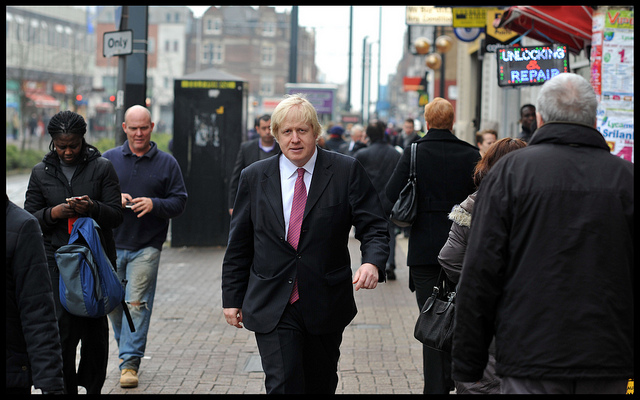Call the bluff, prime minister (part 2)
The Brexiteers had their chance in the past two years – they have pushed around a cabinet with a zeal driven by ideology, not practicality or reality. It is time for the remaining adults in the room to take charge. It is time for Theresa May to call the hard right’s bluff. Whether she will have the spine to do so is an entirely different matter.
Confrontation as Solution
However, even at this juncture, there is one thing the Prime Minister can do. She can resign as Leader of the Conservative Party and call a leadership election – daring the hardcore Brexit supporters within her parliamentary party to put up a candidate against her.
Considering that they can barely agree on a common plan for Brexit, the hard right within the Conservative Party would find it difficult to agree on any single candidate. Neither Johnson (widely seen as an opportunist who has made many enemies within the Conservative Party) or prominent, hard-right Eurosceptic MP Jacob Rees-Mogg (whose social views on issues ranging from abortion to equal rights for gay couples and the death penalty are decidedly out of step with the mainstream of the British electorate) have an automatic lock or a proven ability to rally a majority of Conservative MPs in the top 2, which would then (theoretically) move on towards the grassroots membership of the Conservative Party. However, given that time is of the essence (with negotiations needing to be concluded by this autumn to enable ratification of a final agreement), there is a likelihood that such a membership round could be scrapped if the first-place finisher emerges decisively from the parliamentary party’s vote.

Despite what media outlets may tell you, Theresa May (provided she plays her cards right) will likely finish out on top, due to the different factions within the Conservative Party (even among the Brexiteers) not being able to agree on whether removing a sitting prime minister of a minority government is worth the upheaval – or even being able to agree on a common candidate. Johnson is already burnt by his previous abortive leadership attempt, shortly after controversially leading the Leave campaign to victory in the 2016 Brexit referendum. His tenure as Foreign Secretary has not exactly endeared him to the public or his colleagues (especially in Europe), either. His vainglorious resignation letter, hyperbolically referring to the UK as a prospective “vassal state” and “colony” of the EU, may have convinced some ardent Brexit extremists, but is unlikely to play well among swing voters needed to win a general election. Considering these factors and the rather badly-timed resignation, his departure may have been for absolutely nothing – ending his political career prematurely and rendering him toxic as a Conservative leadership candidate.
David Davis, the second senior Tory to resign, has lately only been prominent by his apparent lack of engagement with his own role – leading to one headline claiming that he personally only spent four hours in the negotiations with EU chief negotiator Michel Barnier. Jacob Rees-Mogg, another candidate quite heavily pushed in some quarters of the media and the Conservative Party’s implacable hard right, holds a range of social views (on matters like abortion, LGBT rights and the death penalty) that are clearly out of step with the British mainstream and would render him unelectable outside of Conservative strongholds. Additionally, his overtly hostile attitude towards the EU would further alienate swing voters seeking a prime minister willing to reach some sort of modus vivendi with the EU after Brexit. Chancellor of the Exchequer Philip Hammond, whilst having a somewhat statesmanlike demeanour and having held several senior cabinet roles (including defence and foreign affairs) has been burnt by his support for Remain and his reluctance to acquiesce in the Conservative hard-right faction’s desire to leave the Single Market and the Customs Union. Environment Secretary Michael Gove, whilst enjoying a reputation as a ruthless political operator with the intellect needed for high office, lacks the common touch and has not been the most adept of campaigners. The likes of Sajjid Javid, Liam Fox and Gavin Williamson are either too unknown or have not been in office long enough to merit consideration for the prime minister’s role.
If Johnson, Rees-Mogg or another candidate is unable to muster a majority and they only come in second in the first round of voting among the Conservative Party’s MPs in the House of Commons, or Prime Minister May prevails decisively, she should then use that newfound authority to dismiss every single hard-right, Leave-supporting cabinet minister and replace them with pragmatists who will act in the interests of Britain’s economy, and its links to the rest of the EU (which remains its largest trading partner). She should then negotiate a decidedly soft version of Brexit (quite possibly the Norway model, since it can be implemented swiftly – and has already been tested elsewhere) and put it to a final vote in a referendum. If Brexiteers try to oppose her at any juncture, she could impose a three-line whip during any major parliamentary votes and dare them to split the Conservative Party and clearly assign blame for a possible victory of the Labour Party under Opposition Leader Jeremy Corbyn on those rebels, and them alone. After all, the Conservative Party fears nothing more than the Labour Party seizing power in a general election. The current turmoil and disunity within the Conservative Party may very well drive a number of voters towards Labour and Liberal Democrats in the opinion polls. Such a tough approach on the Brexiteers might also encourage Labour to settle its age-old question on how it stands on Brexit. In fact, Labour actually holds all the cards now – without its support, any prime minister will not be able to dissolve Parliament. Why Corbyn should do a Conservative prime minister such a favour (again) is anyone’s guess.
The Brexiteers had their chance in the past two years – they have pushed around a cabinet with a zeal driven by ideology, not practicality or reality. It is time for the remaining adults in the room to take charge. It is time for Theresa May to call the hard right’s bluff. Whether she will have the spine to do so is an entirely different matter.
| Read part one of Call the Bluff, image by Flickr - BackBoris2012 Campaign TeamMore blogs on Law Blogs Maastricht |
-
In office, not in power
She decides: Arleen Foster, MLA, the leader of the Democratic Unionist Party effectively pulls the strings on the Conservative minority government.
